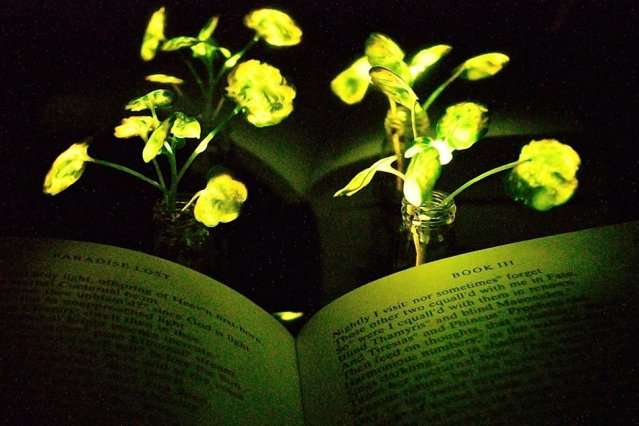Best of Last Week–An alternative explanation for cosmic acceleration, plants that glow and positive impact of journaling

(ScienceX)—It was a good week for physics as a team at Princeton University announced a new silicon structure that opens the gate to quantum computers—it could be used to precisely control quantum behavior between pairs of electrons. In related news a team at the University of New South Wales unveiled a complete design of a silicon quantum computer chip—one that allows quantum calculations to be performed using existing semiconductor components. Also, a trio of mathematicians, Blake Temple, Zeke Vogler and Joel Smoller, proposed an alternative explanation for cosmic acceleration—one that does without dark energy theories.
It was also a good week for biology, as a small team of researchers from Germany and New Zealand found that an ancient penguin was as big as a human—when alive, it would have measured approximately 1.77 meters in length when swimming. Also, a team of engineers at MIT created plants that glow by embedding specialized nanoparticles into the leaves of a watercress plant. And a team at Vanderbilt University announced that they had developed a hyperlens crystal capable of viewing living cells in unprecedented detail—such as a virus sitting on an individual cell.
In other news, University of Texas astronomer Andrew Vanderburg and Google's Christopher Shallue made headlines when they announced that they had discovered a new planet that revealed a distant solar system to rival our own—it has the same number of planets. And a team from Brock University also made headlines with their study that confirmed a link between the number of older brothers and the increased odds of being homosexual. And a pair of researchers with Duke University, Dean Culver and Yaroslav Urzhumov, described an electromagnetic water cloak that eliminates drag and wake.
And finally, if you are one of the millions who keep a diary, you might be interested in a study conducted by a trio of researchers, two with the University of Oregon, the other Harvard University, who suggest doing so might be have an impact on you that you didn't realize—Christina M. Karns, William Moore and Ulrich Mayr found that journaling inspires altruism through an attitude of gratitude.
© 2017 ScienceX